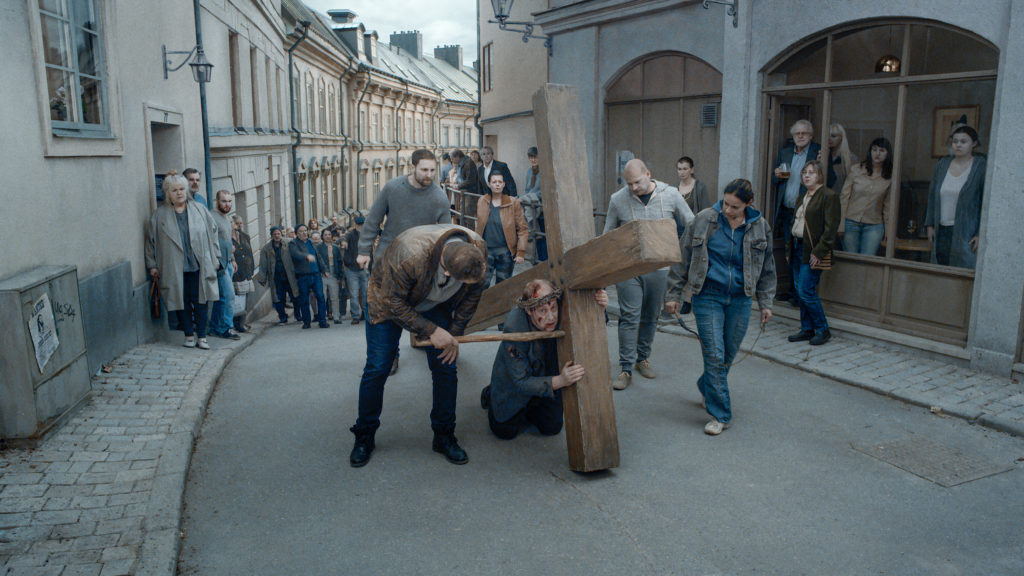About Endlessness (2021 | Sweden, Germany, Norway | 74 minutes | Roy Andersson)
Late in Roy Andresson’s About Endlessness a man in a cafe watches in awe as snow falls gently outside a cafe window. A soft choral rendition of “Silent Night” accompanies the snowflakes, but no one seems to notice. He interrupts his fellow patrons’ quiet indifference to ask “Isn’t it fantastic?” To their quizzical responses he clarifies, “Everything”. Its as close a thesis statement as you’re going to get from this poetic contemplation of the mundane and profound that unfolds in dozens of short vignettes over seventy-four minutes.
The film opens with a fantastical shot of a couple wordlessly floating in an embrace through gray clouds over what turns out to be bombed out Cologne, Germany. From there, it proceeds into a series of episode, if these minute filmic observations could even be called that, many of which are introduced Scheherazade-like by a disembodied woman’s voice recounting a person that she witnessed: “I saw a woman… a communications manager, incapable of feeling shame” or “I saw a couple, two lovers… floating above a city, renowned for its beauty, but now in ruins”. Whether the observations are magical or ordinary, the camera’s perspective retains the same detached reserve and the scenes are shot in similar crisp bright light and sharp focus, a soft box appearance that hints at the entire film having been shot in Andersson’s Stockholm studio, combining film of actors with footage from intricately constructed models.

Despite a viewer’s natural interest in finding connections in these scenes, only a couple feature recurring characters. A middle-aged man annoyed by an old schoolmate’s success and baffled by his lack of interest in reconnecting bookend the film. In between, we follow a priest who has lost his faith through nightmares of torture, drunken presentations of communion, and attempts to discuss his crisis with a detached therapist whose interest in catching a bus outweighs his duty to his patient. The episodes are, in turn, upsetting, sad, and wryly funny.
As intended, the effect is casts a sense of timelessness over each reminiscence, whether it’s a teen boy noticing a pretty girl as he walks down a city street or a man shielding his young daughter with an umbrella as he ties her shoe on a rain-soaked trek to a birthday party. A few scenes twinge with absurdity — an older man alone in a restaurant ignores the waitstaff scurrying around him in favor of a newspaper until one overfills his wineglass — others present the silent horrors of a visit to an uncaring dentist. Most of them feature not-particularly-photogenic characters who speak at three-quarters speed and whose movements appear to be slowed by invisible JELL-O. Very few, aside from a lovely shot capturing teenage girls pausing outside a countryside restaurant to dance to the music spilling onto the outdoor picnic area, could be characterized as traditionally “upbeat”. A handful provide jarring contrast with the domestic, showing a dark bunker at the conclusion of a terrible war and a scene of soldiers being marched off to a prison camp through the snow.
Like its title, you get the sense that these tiny film poems could go on forever, but mercifully they play out for just over an hour. It’s just enough time to be question the form, become frustrated by the lack of obvious connections, and then surrender to the parade of detached artifacts. In an interview, Andersson said “I am not a pessimistic person but the fact is: there is no hope. Life is a tragedy”. With this form that treats each scene equally, the director seems to be challenging us to ponder why each moment was selected, how (or if) it’s special, and to question why these people refuse to notice the ordinary wonders surrounding them. Whether this documentation of the deterioration of hope is an indictment, a simple observation, or a call to change will likely land differently with each viewer as questions for the ages.
About Endlessness is playing at SIFF’s virtual cinema.


